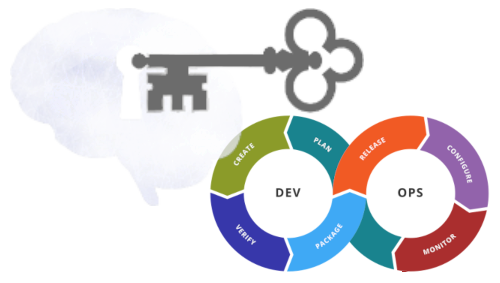DevOps Transformation: Mindset

One of the Merriam-Webster Dictionary definitions for mindset it:
a fixed state of mind
Introducing new technologies, adapting existing processes, establishing new structures, all of them must support the change of mindset needed in the organisation.
Organisational transformation is a complex process that requires a significant shift in mindset for everyone involved. When it comes to DevOps, the transformation is even more challenging due to the unique nature of this methodology.
Table of Contents
DevOps is a cultural shift that aims to improve collaboration and communication between development and operations teams. It involves the integration of software development and IT operations to streamline the entire software delivery process. However, the adoption of DevOps requires a significant change in mindset, and this change needs to happen at all levels of the organisation.
Continuous Processes Instead of Projects
The first mindset change that needs to happen is to view software development as a continuous process rather than a one-off project. This means that developers and operations teams need to work together to continuously improve the software, rather than just focusing on the initial development process. The continuous process requires a different approach to software development, testing, and deployment, and everyone involved needs to understand this shift.
Fail Fast and Learn Quickly
The second mindset change is to embrace the concept of fail fast and learn quickly. In the traditional software development process, failures are seen as a negative outcome that needs to be avoided at all costs. However, in DevOps, failures are seen as opportunities for improvement. This means that everyone involved needs to be comfortable with the idea of failing fast and learning from those failures.
Focus on Collaboration
The third mindset change is to focus on collaboration rather than individual achievements. DevOps requires a high level of collaboration between development and operations teams, which means that everyone needs to work together towards a common goal. This requires a change in mindset from individual achievements to team success.
Automation
The fourth mindset change is to embrace automation. DevOps relies heavily on automation to streamline the software delivery process. This means that everyone involved needs to understand the importance of automation and how it can improve the software development process. Developers and operations teams need to work together to automate as much of the software delivery process as possible, including testing, deployment, and monitoring.
Improve
The fifth mindset change is to focus on continuous improvement. DevOps is all about continuous improvement, which means that everyone involved needs to be open to change and willing to adapt. This requires a culture of experimentation, where everyone is encouraged to try new things and learn from their mistakes.
Focus on Customer
The sixth mindset change is to adopt a customer-centric approach. DevOps is ultimately about delivering value to customers, which means that everyone involved needs to have a deep understanding of customer needs and preferences. This requires a shift in mindset from internal process optimization to customer satisfaction.
Use Facts to Decide
The seventh mindset change is to embrace data-driven decision making. DevOps relies heavily on data to make informed decisions about software development, testing, and deployment. This means that everyone involved needs to be comfortable with data analysis and interpretation. Developers and operations teams need to work together to collect, analyze, and interpret data to continuously improve the software delivery process.
Communication
The eighth and final mindset change is to embrace a culture of transparency and communication. DevOps requires a high level of transparency and communication between development and operations teams. This means that everyone involved needs to be comfortable with open communication and sharing information. Developers and operations teams need to work together to share knowledge, discuss challenges, and collaborate on solutions.
Conclusion
In conclusion, DevOps requires a significant shift in mindset for everyone involved. This shift includes embracing a continuous process, failing fast and learning quickly, focusing on collaboration, embracing automation, focusing on continuous improvement, adopting a customer-centric approach, embracing data-driven decision making, and embracing a culture of transparency and communication. Organisations that successfully embrace these mindset changes will be well positioned to adopt DevOps and reap the benefits of this powerful methodology.